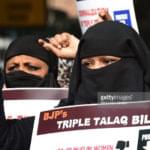Opinions
Love Jihad, Conversion and More

By Ajitha Menon
Any forcible conversion is to be condemned. Having said that, it has to be underlined that the Indian constitution grants religious freedom as a fundamental right and every citizen, irrespective of class, creed, gender or caste has the right to practice the religion of his or her choice with impunity – this includes converting to another religion as a matter of personal choice.
On the other hand, rape is a criminal offence, punishable to the highest degree if proven – as deemed by law in India.
The bogey of ´love jihad´ being raised in various quarters and by certain political groups in relation to the incident in Sarawa village in Uttar Pradesh needs to be considered in the above context as the case has alleged elements of both forcible religious conversion and rape.
To put matters in perspective, according to a police complaint filed on August 3rd, a 20-year old girl was abducted, held and raped by several men before being forcibly converted to Islam. Police sources say these allegations are yet to be investigated. However, in the meantime, communal politics has publicized the whole case as ´love jihad´ or ´romeo jihad´ – an alleged conspiracy by young Muslim boys or men under which they target non-Muslim girls through the pretence of falling in love and then converting them to Islam.
First of all the case itself – there is no doubt that the girl should get justice if she is a gang-rape victim. It is a clear cut criminal case against the alleged rapists. Does the religion of the rapists make the heinous act of rape greater or lesser in any way? The issue of forcible conversion comes next. If proven, law can take its own course in this matter too. But mixing the two separate offences to give the whole matter a communal angle will only further the vicious communal agenda of certain groups but in no way help in bringing the culprits to justice or protect the rights of the girl.
Now for the matter of ´love jihad´ – was any of the men involved in the case in love with the girl? Did the girl reciprocate that love? These are uncomfortable questions for many touting communal lines in this case, but the fact remains that if a couple are in love, irrespective of religion or caste, this country´s constitution does grant them the right to be in love, get married, and live happily ever after. Moreover, besides the parties involved in the love affair, no outsider can judge if either person´s love was ‘pretence’ and not real. Then the investigation in the case should be along different lines – were both lovers victims of religious hatred which led to the alleged gang rape and forcible conversion? In that case, accepting the possible Muslim lover also as a victim would not go down very well in some quarters – will it?
Leaving the Sarawa case aside, some established perceptions need to be considered here. Firstly, it is generally believed that anyone marrying a Muslim has to convert to Islam or is forcibly converted to Islam. The same belief prevails in case one is marrying a Christian too. Presumably, a Hindu marrying a Muslim or a Christian is doing so out of love as the chances of this being an arranged marriage is still largely impossible in India! In that case, if the parties are in love – it can be assumed that they have discussed the matter of religion and also decided whether one party has to convert or not? Then why is it termed ´forcible conversion´?
Secondly, why isn´t the Special Marriage Act not there in the picture – why does it lack publicity? After all, the Act does allow people of different religions to get married without converting. Each party can retain their religion and still get married under this Act. Most young boys and girls tying an inter-religious knot are unaware of this constitutional sanction and that is largely why they end up thinking that conversion is the right or only option to find social acceptance for such weddings.
What remains undiscussed furtheris why most women marrying into another religion feel compelled to convert while the men don´t feel the same compulsion. Sense of identity of women in this male dominated society is anyway low and most of them cannot even conceive the idea that their religious identity is as important as that of the man’s. They end up with the conviction that conversion to the male’s religion is the only acceptable social sanction for themselves as well as for their children. A myth propagated, aided and abetted by our socio-religious structures – and this goes for all prevailing religions.
What of a Hindu man marrying a Muslim or a Christian girl? Is that ´love jihad´? Does that girl automatically become a Hindu? What is her religion? Admittedly, one hardly hears of conversion in such cases but do the Muslim or Christian girl continue as a Muslim or Christian in her husband´s household or do they adhere to the Hindu family social and religious norms? Above all how does it matter if they love each other and want to be together as is their ´right´. One can vote at 18 to decide who will run a country of over one billion people but is denied the right to decide whom one should marry!
The first question that so-called well wishers ask couples in inter-religious marriages – if they have got married under the Special Marriage Act – what will be the religion of your children? Any answer which indicates that such children will be brought up under the benevolence of not one but two world religions and can decide for themselves at age 18 or 21 if they want to follow both or either oneis met with total disbelief or scepticism. But isn’t it possible? There are several anonymous families in this country living on this principle and doing so in absolute peace and harmony and tolerance of all religions. Isn’t that more acceptable than communal feuds at all levels?
Think for a moment – after all we live in a country which promotes the idea of daughters being ´parayadhan´ – and mostly by Hindus – they are expected to take the name of their husband, in some cases even their given names are changed by the in-laws, they are supposed to adopt to the culture prevailing in the homes of their in-laws, follow new rules and new principles once they are married. From first obeying father and brother, they are made to switch obeisance to husband, brother in law and father in law and then their sons. They are told as they leave their parental home – dolimeinjaoaurarthimeinniklo – go as a bride but leave your in-laws home only when dead. Most parents absolve themselves of all responsibility of their daughters once they are married, the parental home´s doors are closed to them. They have to find a home with their in-laws any which way, whatever the price they have to pay in terms of self-respect or independence. Isn´t that conversion of identity in any case? And religion is just one part of that identity anyway, isn’t it?
Why should those who make the choice of co-habiting peacefully with other religions, tolerating other´s beliefs and accepting a mingling of different religions for the upbringing of their children be denied that right? Why should they live in fear of communal attacks or be forced to admit or accept the concept of a ´love jihad´? Why can´t India and Indians believe and accept that people from two different religions can fall in love and live happily ever after? They don´t need your permission or acceptance. Just leave them alone and they will find their own way.
